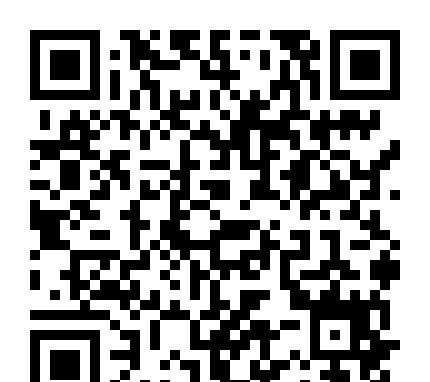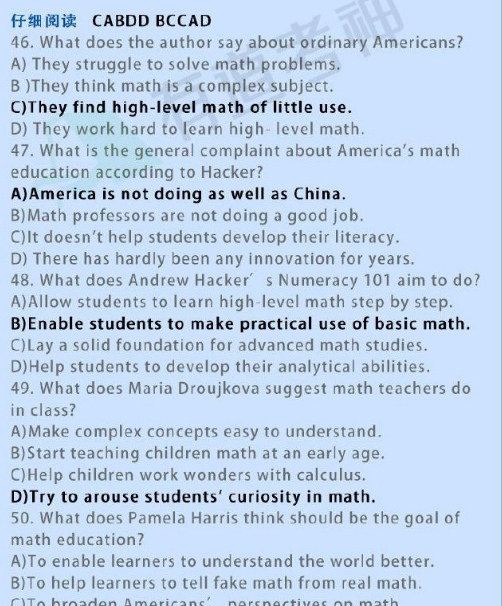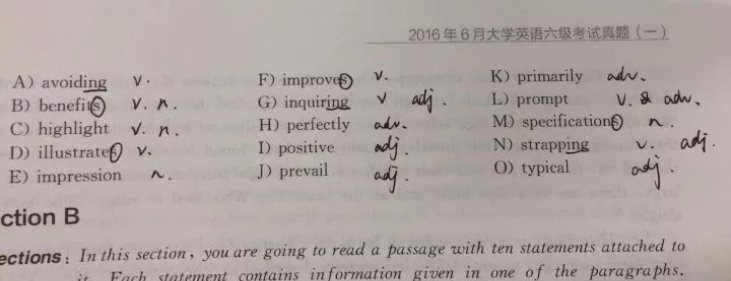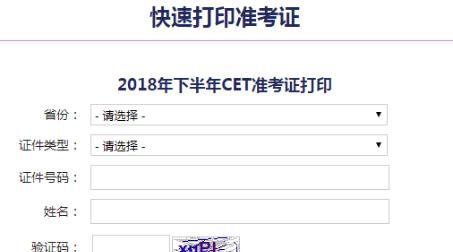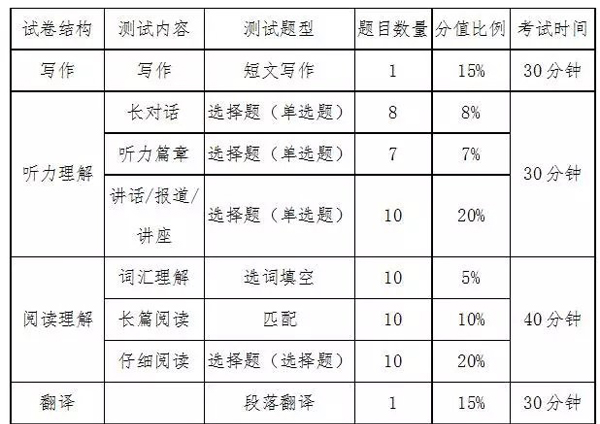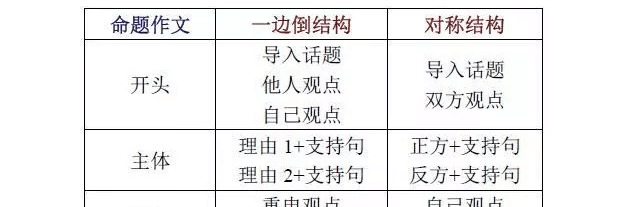|
Ⅰ.单项填空(共25小题,每小题1分;满分25分) A)从A、B、C、D中找出其划线部分与所给单词的划线部分读音相同的选项。
例:have A. gave B. save C. hat D. made
答案是C。
1. longerA. London B. prove C. lock D. lonely
2. admireA. quiet B. stare C. spear D. figure
3. Christmas A. speech B. stomachC. chargeD. church
4. advanced A. taskB. fortunate C. entrance D. salute
5. third A. southernB. weatherC. thus D. theory
B)从A、B、C、D四个选项中,选出可以填入空白处的最佳答案。
例:Welast night, but we went to the concert instead.
A. must have studied
B. might study
C. should have studied
D. would study
答案是C。
6. —my glasses?
—Yes, I saw them on your bed a minute ago.
A. Do you see B. Had you seen
C. Would you see D. Have you seen
7. —When shall we meet again?
—Make itday you like; it's all the same to me.
A. one B. any C. another D. some
8. Johnny, youplay with the knife, you hurt yourself.
A. won't;can't B. mustn't; may
C. shouldn't; must D. can't; shouldn't
9. —I'm sorry I broke your mirror.
—Oh, really?.
A. It's OK with meB. It doesn't matter
C. Don't be sorry D. I don't care
10. I'll look into the matter as soon as possible. Just have a little.
A. wait B. time
C. patience D. rest
11. How beautifully she sings! I have never heard.
A. the better voice B. a good voice
C. the best voice D. a better voice
12. Tom felt that he knew everybody's business better than they knew it.
A. themselves B. oneself
C. itself D. himself
13. Many people agree thatknowledge of English is a must in international trade
today.
A. a; 不填B. the; an
C. the; the D. 不填; the
14. The number of people invitedfifty, but a number of them absent for different
reasons.
A. were; was B. was; was
C. was; were D. were; were
15. We decided not to climb the mountains because it was raining.
A. badly B. hardly
C. strongly D. heavily
16. After living in Paris for fifty years he returned to the small townhe grew up as a child.
A. which B. where
C. that D. when
17. Helen her keys in the office so she had to wait until her husbandhome.
A. has left; comesB. left; had come
C. has left; came D. had left;would come
18. The patient was warnedoily food after the operation.
A. to eat not B. eating not
C. not to eat D. not eating
19. You didn't let me drive. If wein turn, youso tired.
A. drove, didn't get
B. drove; wouldn't get
C. were driving; wouldn't get
D. had driven; wouldn't have got
20. —Can I help you, sir?
—Yes. I bought this radio here yesterday, but it.
A. didn't workB. won't work
C. can't work D. doesn't work
21. It is wise to have some moneyfor old age.
A. put away B. kept up
C. given away D. laid up
22. we can't get seems better thanwe have.
A. What;what B. What;that
C. That;that D. That;what
23. in thought, he almost ran into the car in front of him.
A. Losing B. Having lost
C. Lost D. To lose
24. I love to go to the seaside in summer. Itgood to lie in the sun or swim in
the cool sea.
A. does B. feels
C. gets D. makes
25. we'll go camping tomorrow depends on the weather.
A. If B. Whether
C. That D. Where Ⅱ.完形填空(共25小题,每小题1分;满分25分) 阅读下面短文,掌握其大意,然后从26—50各题所给的四个选项中,选出一个最佳答案。
The measure of a man's real character is what he would do if he knew he would never be found out. —Thomas Macaulay
Some thirty years ago, I was studying in a public school in New York. One day, Mrs Nanette O'Neill gave an arithmetic 26 to our class. When the papers were 27 she discovered that twelve boys had made exactly the 28 mistakes throughout the test.
There is nothing really new about 29 in exams. Perhaps that was why Mrs O'Neill 30 even say a word about it. She only asked the twelve boys to 31 after class. I was one of the twelve.
Mrs O'Neill asked 32 questions, and she didn't 33 us either. Instead, she wrote on the blackboard the 34 words by Thomas Macaulay. She then ordered us to 35 these words into our exercise-books one hundred times.
I don't 36 about the other eleven boys. Speaking for 37 I can say:it was the most important single 38 of my life. Thirty years after being 39 to Macaulay's words, they 40 seem to me the best yardstick(准绳), because they give us a 41 to measure ourselves rather than others.
42 of us are asked to make 43 decisions about nations going to war of armies going to battle. But all of us are called 44 daily to make a great many personal decisions. 45 the wallet, found in the street, be put into a pocket 46 turned over to the policeman? Should the 47 change received at the store be forgotten or 48? Nobody will know except 49. But you have to live with yourself, and it is always 50 to live with someone you respect.
26. A. test B. problem C. paper D. lesson
27. A. examined B. completedC. marked D. answered
28. A. easy B. funnyC. same D. serious
29. A. lying B. cheating C. guessing D. discussing
30. A. didn'tB. did C. would D. wouldn't
31. A. come B.leave C. remain D. apologize
32. A. noB. certain C. many D. more
33. A. excuseB. reject C. help D. scold
34. A. above B. common C. following D. unusual
35. A. repeatB. get C. putD. copy
36. A. worry B. know C. hear D. talk
37. A. myselfB. ourselvesC. themselves D. herself
38. A. chanceB. incident C. lesson D. memory
39. A. referred B. shownC. broughtD. introduced
40. A. even B. stillC. always D. almost
41. A. way B. sentence C. choice D. reason
42. A. All B. Few C. Some D. None
43. A. quick B. wise C. great D. personal
44. A. out B. for C. up D. upon
45. A. ShouldB. Must C. Would D. Need
46. A. and B. or C. then D. but
47. A. extra B. smallC. some D. necessary
48. A. paid B. remembered C. shared D. returned
49. A. meB. you C. us D. them
50. A. easier B. more natural
C. better D. more peaceful Ⅲ. 阅读理解(共25小题。A)节每小题2分,B)节每小题1分;满分45分)
A)阅读下列短文,从每题所给的四个选项中,选出最佳答案。 A
We walked in so quietly that the nurse at the desk didn't even lift her eyes from the book. Mum pointed at a big chair by the door and I knew she wanted me to sit down. While I watched mouth open is surprise, Mum took off her hat and coat and gave them to me to hold. She walked quietly to the small room by the lift and took out a wet mop. She pushed the mop past the desk and as the nurse looked up, Mum nodded and said, "Very dirty floors. "
"Yes, I'm glad they've finally decided to clean them, "the nurse answered. She looked at Mum strangely and said, "But aren't you working late?"
Mum just pushed harder, each swipe(拖一下)of the mop taking her farther and farther down the hall. I watched until she was out of sight and the nurse had turned back to writing in the big book.
After a long time Mum came back. Her eyes were shining. She quickly put the mop back and took my hand. As we turned to go out of the door, Mum bowed politely to the nurse and said, "Thank you."
Outside, Mum told me, "Dagmar is fine. No fever. "
"You saw her, Mum?"
"Of course. I told her about the hospital rules, and she will not expect us until tomorrow. Dad will stop worrying as well. It's a fine hospital. But such floors!A mop is no good. You need a brush."
51. When she took a mop from the small room what Mum really wanted to do was.
A. to clean the floor B. to please the nurse
B. to see a patientD. to surprise the story-teller
52. When the nurse talked to Mum she thought Mum was a.
A. nurse B. visitor
C. patient D. cleaner
53. After reading the story what can we infer about the hospital?
A. It is a children's hospital.
B. It has strict rules about visiting hours.
C. The conditions there aren't very good.
D. The nurses and doctors there don't work hard.
54. From the text we know that Dagmar is most likely
A. the story-teller's sister
B. Mum's friend
C. the story-teller's classmate
D. Dad's boss
55. Which of the following words best describes Mum?
A. strangeB. warm-hearted
C. clever D. hard-working
B
When you want to see if a library has the book you want, you can use the catalogue(目录)in the library. Most catalogues of books in a library take the form of small cards kept in boxes. One way of arranging(排列)the cards is in ABC order by the family names of the writers.
Catalogue cards usually give the following important information:(1)the name of the writer, (2)the shelf-mark(架号), that is, the Dewey number which helps people to find where the books are, (3)the title of the book, (4)the year of publication and the publisher, and (5) the number of pages in the book.
56. If you know the title of a book and want to find out if it is in the catalogue,
what else do you need to know?
A. The shelf-mark.
B. The name of the writer.
C. The Dewey number.
D. The year of publication.
57. Which of the following is the kind of catalogue card described in the text? 
C
Most animals have little connection with animals of a different kind, unless they hunt them for food. Sometimes, however, two kinds of animals come together in a partnership(伙伴关系)which does good to both of them. You may have noticed some birds sitting on the backs of sheep. This is not because they want a ride, but because they find easy food in the parasites (寄生虫)on sheep. The sheep allow the birds to do so because they remove the cause of discomfort. So although they can manage without each other, they do better together.
Sometimes an animal has a plant partner. The relationship develops until the two partners cannot manage without each other. This is so in the corals(珊瑚)of the sea. In their skins they have tiny plants which act as"dustman", taking some of the waste products from the corals and giving in return oxygen which the animal needs to breathe. Ifthe plants are killed, or are even prevented from light so that they cannot live normally, the corals will die.
58. Some birds like to sit on a sheep because.
A. they can eat its parasites
B. they depend on the sheep for existence
C. they enjoy travelling with the sheep
D. they find the position most comfortable
59. The underlined word"they"in the last sentence of the first paragraph refers
to .
A. birds and parasites B. birds and sheep
C. parasites and sheep D. sheep, birds and parasites
60. It can be learnt from the text that the coral depends on the plant for.
A. comfort B. light
C. food D. oxygen
61. What does the second paragraph mainly discuss?
A. Some animals and plants depend on each other for existence.
B. Some animals and plants develop their relationship easily.
C. Some plants depend on each other for food.
D. Some animals live better together.
D
In the 19th century England people liked to go to the seaside. In those days, ladies wore long bathing dresses, and men wore bathing suits. Women did not walk about on the beach(沙滩)in their bathing dresses. They hired a bathing machine. A bathing machine was used for changing in, and for taking the bather down to the sea. It cost 2 pence(便士) to hire a machine and an attendant(侍者). When she had paid, the bather climbed up the back steps and got into the bathing machine . Then she changed into her bathing dress. When she had changed, the machine was pulled down to the sea. The bathing machine stoped in the water and the bather went down the front steps into the water. If she did not want to get into the sea, the attendant pulled her in.
62. A 19th century English lady bathing in the sea would wear something like:
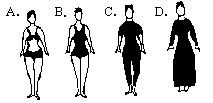 63. Who used the bathing machine?
A. Women bathers.
B. Both men and women bathers.
C. Bathers who couldn't swim.
D. Bathers who couldn't walk.
64. bathing machine was mainly used for.
A. giving the bather a pleasure ride on the beach
B. giving the bather some exercise before getting into the water
C. protecting the bather from catching cold from the sea wind
D. protecting the bather from being seen in a bathing dress out of water
65. In 19th century people who used the bathing machine usually did the following
thing which is the right order for doing them?
a. Changing into bathing clothes
b. Getting out of the bathing machine
c. Paying 2 pence
d. Getting into the bathing machine
e. Being taken down the beach
f. Getting into the water
A. e, d, a, b, f, c B. c, d, a, e, b, f
C. c, d, e, a, b, f C. d, a, e, b, f, c
E
EVENTS(赛事)
Bicycle tour(旅行)and race
A bike tour and race will be held on August 26 and 27(Sat. & Sum. ). At 5:30am, the riders will leave Tian'anmen Square and ride the first 35 kilometres as a training leg. Then the next 55 kilometre leg, from Yanjiao to Jixian, will be the first competitive(竞争性的)part of the tour. The riders and their bikes will then be taken from Jixian to Changli.
The second racing leg of the tour will be from Changli to the seaside of Nandaibe, covering a distance of 20 kilometres. Saturday night includes the stay at Nandaihe and supper. Sunday morning is free for play at the seaside. At noon all the people and their bikes will be taken back to Beijing.
Cost:200 yuan Telephone:4675027
Brazilian footballers
The Brazilian Football Club will play Beijing Guo'an Team at the Workers Stadium on August 26. The club has four national team players . Also coming is 1994 US World Cup star Romario ho has promised to play for at least 45 minutes.
Ticket prices:60,100,150 yuan
Time/Date:4:30 pm, August 26(Sat. ) Telephone:5012372
Rock climbing
The Third National Rock Climbing Competition will be held on August 26-27 at the Huairou Mountain-climbing Training Base. More than 10 teams from Beijing, Wuhan, Dalian, Jilin and other places will take part in it. A Japanese team will give an exhibition climbing. Free for spectators(观众).
Take a long-distance bus from Dongzhimen to Huairou.
Time/Dates:9-12 am, August 26 and 27
Telephone:7143177, 7144850, Wang Zhenghua
66. The main purpose of announcing the above events is to give information about.
A. visiting teams
B. famous players
C. things to do for the weekend
D. prices to pay for the sports events
67. If you take part in the bike tour, you will ride for.
A. 35 kilometres B. 55 kilometres
C. 75 kilometres D. 110 kilometres
68. the underlined word "leg" in "Bicycle tour and race" probably means.
A. race
B. practice
C. part of the training
D. part of the tour
69. What is special about the rock climbing competition?
A. A foreign team takes part in it.
B. You can watch it without paying.
C. You don't have to be a sportsman to take part.
D. The bus trip to the place of the competition is free.
70. If you want to find something to do for Saturday afternoon, which telephone
number will you call?
A. 4675027B. 7143177
C. 5012372D. 7144850
B)根据对话内容,从对话后的选项中选出能填入空白处的最佳选项。选项中有两项为多余选项。
—Hello. Gerry speaking.
—Hello, Gerry. It's me John here. 71
—Well, I'm terribly sorry, but I'm not feeling very well.
—Is that all? 72
—No, I'm sorry. I was sick all night. I think it must be the fish Iate I ast night.
—Well, I think you should have at least phoned Kate and told her you weren't coming
to the meeting.
—73 I'm sorry about that. Anyway, I think I'll be able to get in to work tomorrow.
—74
—I won't. Thanks for calling.
—75
A. Why didn't you phone?
B. OK. Take care and don't eat any more fish.
C. Why aren't you here at the meeting?
D. That's all right.
E. We thought you might have had an accident or forgotten the day or something.
F. I'll be glad to see you again.
G. Yes, I suppose I should have done so. Ⅳ.单词拼写 (共10题,每小题1分;满分10分) 根据下列句子及所给汉语注释,在句子后边的横线上,写出空缺处各单词的正确形式。(每空只写一词)
76. Rice is grown in China, Japan and other (亚洲)countries. 76.
77. We aim at (质量)rather than quantity. 77.
78. The National Games were well (组织). 78.
79. Does Radio Beijing (播送)the news every hour on the hour? 79.
80. Several new railways are under (建设)in China.80.
81. The students were listening to the teacher (专心).81.
82. We finally (说服)the peasant to send his daughter to school. 82.
83. Children are (好奇)about everything around them. 83.
84. She's bought some (衣料)to make herself a dress. 84.
85. The (政府)will build more houses for the peopple. 85. Ⅴ.短文改错 (共10小题,每小题1. 5分;满分15分) 此题要求改正所给短文中的错误。对标有题号的每一行作出判断:如无错误,在该行右边横线上画一个勾(√);如有错误(每行只有一个错误),则按下列情况改正:
此行多一个词:把多余的词用斜线()划掉,在该行右边横线上写出该词,并也用斜线划掉。
此行缺一个词:在缺词处加一个漏字符号( ),在该行右边横线上写出该加的词。
此行错一个词:在错的词下划一横线,在该行右边横线上写出改正后的词。
注意:原行没有错的不要改。
Today I visited the Smiths—my first time visit86.
to a American family. They live in a small 87.
town. It was very kind for them to meet me 88.
at the railway sation and drove me to their home. 89.
The Smiths did his best to make me feel90.
at home. They offered me coffee and other 91.
drinks. We have a good time talking and laughing 92.
together. They eager to know everything about 93.
China and asked me lots of question. In fact, 94.
they are planning to visit China in next year. 95.
Ⅵ.书面表达 (满分30分) 你是李华,申请到一家外资企业工作。对方要求你用英语写一篇短文,介绍自己的基本情况。
短文应包括下表所列全部内容。
注意:1. 情况介绍必须采用短文形式;
2. 词数100个左右;
3. 短文第一句已为你写好。
生词:竞赛—competition
My name is Li Hua. 参 考 答 案
Ⅰ,Ⅱ,Ⅲ(Key to 1—75)
1. C 2. A 3. B 4. A 5. D 6. D 7. B 8. B9. B
10. C 11. D 12. A 13. A 14. C 15. D 16. B 17. C 18. C
19. D 20. D 21. A 22. A 23. C 24. B 25. B 26. A 27. C
28. C 29. B 30. A 31. C 32. A 33. D 34. A 35. D 36. B
37. A 38. C 39. D 40. B 41. A 42. B 43. C 44. D 45. A
46. B 47. A 48. D 49. B 50. C 51. C 52. D 53. B 54. A
55. C 56. B 57. A 58. A 59. B 60. D 61. A 62. D 63. A
64. D 65. B 66. C 67. D 68. D 69. B 70. C 71. C 72. E
73. G 74. B 75. D
Ⅳ.
76. Asian 77. quality 78. organized/organised
79. broadcast 80. construction 81. attentively
82. persuaded 83. curious 84. material(s)/cloth
85. government
Ⅴ.
Today I visited the Smiths—my frist time visit86. time
to a American family. They live in a small 87. an
town. It was very kind for them to meet me 88. of
at the railway station and drove me to their home 89. drive
The Smiths did his best to make me feel90. their
at home. They offered me coffee and other 91. √
drinks. we have a good time talking and laughing 92. had
together. They eager to know everything about 93. were
China and asked me lots of question. In fact 94. questions
they are planning to visit China in next year 95. in
Ⅳ. One possible version:
My name is Li Hua. I was born in Dalian, Liaoning province in February 1977. I started school in 1984 when I was seven. I studied in Guangming Primary School from 1984 to 1990. After that I went to No.62 Middle School of Dalian and graduated this summer. The main subjects I studied at school included Chinese, maths, English, physics, chemistry and computer.I like English and computer best and I am very good at them. Last year I won first prize in the school computer competition. In my spare time I enjoy listening to popular music and collecting stamps. My favourite sports are swimming in summer and skating in winter.
|



